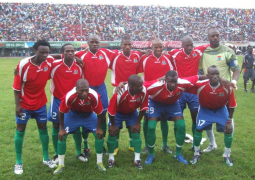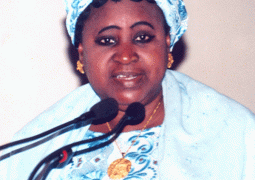The celebration of International Women’s Day is a global event that’s been celebrated since 1909. From the Suffragettes marching on the capitol to the Civil Rights Movement, International Women’s Day has a history that spans over 100 years. The first National Woman’s Day was observed throughout the U.S on Feb. 28, 1909, and continued to be celebrated on the last Sunday of February until 1913. However, in 1914 it was transferred to March 8 and has been held on this globally recognized date ever since
International Women’s Day (IWD), originally called International Working Women’s Day, is marked on March 8 every year. In different regions the focus of the celebrations ranges from general celebration of respect, appreciation and love towards women to a celebration for women’s economic, political and social life.
DR AZADEH our health adviser, a senior lecturer at the University of the Gambia is focusing on this week’s article on the celebration of “The World Women’s International Empowerment day” and explains all the aspects of women empowerment nationally and internationally.
What does Women’s Empowerment mean
Despite many international agreements affirming their human rights, women are still much more likely than men to be poor and illiterate. They usually have less access than men to medical care, property ownership, credit, training and employment. They are far less likely than men to be politically active and far more likely to be victims of domestic violence.
The ability of women to control their own fertility is absolutely fundamental to women’s empowerment and equality. When a woman can plan her family, she can plan the rest of her life. When she is healthy, she can be more productive. And when her reproductive rights—including the right to decide the number, timing and spacing of her children, and to make decisions regarding reproduction free of discrimination, coercion and violence—are promoted and protected, she has freedom to participate more fully and equally in society.
Understanding gender equality and women’s empowerment
Gender equality implies a society in which women and men enjoy the same opportunities, outcomes, rights and obligations in all spheres of life. Equality between men and women exists when both sexes are able to share equally in the distribution of power and influence; have equal opportunities for financial independence through work or through setting up businesses; enjoy equal access to education and the opportunity to develop personal ambitions. A critical aspect of promoting gender equality is the empowerment of women, with a focus on identifying and redressing power imbalances and giving women more autonomy to manage their own lives. Women’s empowerment is vital to sustainable development and the realization of human rights for all.
Where women’s status is low, family size tends to be large, which makes it more difficult for families to thrive. Population and reproductive health programmes are more effective when they address the educational opportunities, status and empowerment of women. When women are empowered, whole families benefit, and these benefits often have ripple effects to future generations.
The roles that men and women play in society are not biologically determined -- they are socially determined, changing and changeable. Although they may be justified as being required by culture or religion, these roles vary widely by locality and change over time. UNFPA has found that applying approaches can be key to advancing women’s rights while respecting different forms of social organization.
Addressing women’s issues also requires recognizing that women are a diverse group, in the roles they play as well as in characteristics such as age, social status, urban or rural orientation and educational attainment. Although women may have many interests in common, the fabric of their lives and the choices available to them may vary widely. UNFPA seeks to identify groups of women who are most marginalized and vulnerable (women refugees, for example, or those who are heads of households or living in extreme poverty), so that interventions address their specific needs and concerns. This task is related to the critical need for sex-disaggregated data, and UNFPA helps countries build capacity in this area.
Key issues and linkages
• Reproductive health: Women, for both physiological and social reasons, are more vulnerable than men to reproductive health problems. Reproductive health problems, including maternal mortality and morbidity, represent a major – but preventable -- cause of death and disability for women in developing countries. Failure to provide information, services and conditions to help women protect their reproduction health therefore constitutes gender-based discrimination and a violation of women’s rights to health and life.
• Stewardship of natural resources: Women in developing nations are usually in charge of securing water, food and fuel and of overseeing family health and diet. Therefore, they tend to put into immediate practice whatever they learn about nutrition and preserving the environment and natural resources.
• Economic empowerment: More women than men live in poverty. Economic disparities persist partly because much of the unpaid work within families and communities falls on the shoulders of women and because they face discrimination in the economic sphere.
• Educational empowerment: About two thirds of the illiterate adults in the world are female. Higher levels of women’s education are strongly associated with both lower infant mortality and lower fertility, as well as with higher levels of education and economic opportunity for their children.
• Political empowerment: Social and legal institutions still do not guarantee women equality in basic legal and human rights, in access to or control of land or other resources, in employment and earning, and social and political participation. Laws against domestic violence are often not enforced on behalf of women.
• Empowerment throughout the life cycle: Reproductive health is a lifetime concern for both women and men, from infancy to old age. UNFPA supports programming tailored to the different challenges they face at different times in life.
Experience has shown that addressing gender equality and women’s empowerment requires strategic interventions at all levels of programming and policy-making.
CONCLUSION
Of the 1.3 billion people who live in absolute poverty around the globe, 70 percent are women. For these women, poverty doesn’t just mean scarcity and want. It means rights denied, opportunities curtailed and Voices silenced. Consider the following:
• Women work two-thirds of the world’s working hours, according to the United Nations Millennium Campaign to Halve world poverty by the year 2015. The overwhelming majority of the labour that sustains life – growing food, cooking, raising children, caring for the elderly, maintaining a house, hauling water – is done by women, and universally this work is accorded low status and no pay. The ceaseless cycle of labor rarely shows up in economic analyses of a society’s production and value.
• Women earn only 10 percent of the world’s income. Where women work for money, they may be limited to a set of jobs deemed suitable for women – invariably low-pay, low-status positions.
• Women own less than 1 percent of the world’s property. Where laws or customs prevent women from owning land or other productive assets, from getting loans or credit, or from having the right to inheritance or to own their home, they have no assets to leverage for economic stability and cannot invest in their own or their children’s futures.
• Women make up two-thirds of the estimated 876 million adults worldwide who cannot read or write; and girls make up 60 percent of the 77 million children not attending primary school. Education is among the most important drivers of human development: women who are educated have fewer children than those who are denied schooling (some studies correlate each additional year of education with a 10 percent drop in fertility). They delay their first pregnancies, have healthier children (each additional year of schooling a woman has is associated with a 5 to 10 percent decline in child deaths, according to the United Nations Population Fund).
Read Other Articles In Article (Archive)




